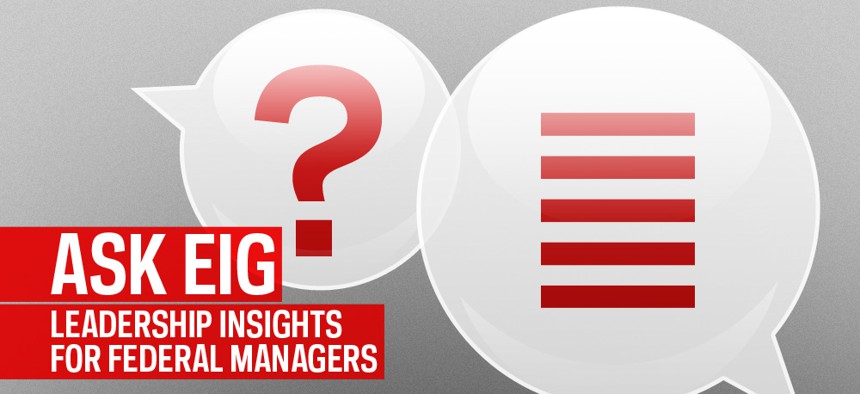
How to Deal With Self-Doubt
Effective leadership is about pursuing the knowledge you don’t have.
Ask EIG is your chance to seek answers to public sector management challenges and conundrums. Submit your questions at AskEIG@govexec.com.
How does a leader address self-doubt? It arises in all types of situations but particularly those in which he/she feels inexperienced with a topic or subject matter. --Anonymous
All too often, leaders confront situations that are new to them or for which they don’t have much experience. When confronted with such novel situations -- at least novel to them -- self-doubt about how they address the situation is natural. It also may be desirable.
Self-doubt is a lack of faith or confidence, which, at first blush, you may think inhibits leadership and decision-making. Yet the desirability of self-doubt comes from the simple fact that many people can be overconfident about their decisions. A little self-doubt can be a useful counterbalance to overconfidence, if used wisely. The key challenge for leaders is to figure out how to handle situations when either self-doubt or overconfidence threatens to undermine the quality and effectiveness of their decisions.
How can you overcome self-doubt or overconfidence when tackling situations in which you do not have much experience? Self-doubt and overconfidence can impact your decisions in two ways. First, these two emotions can cause you to make bad decisions or, in some cases, no decision at all. Second, and I believe more importantly, they can cause you to skip over making sure that you are the tackling the right problem to begin with. If you haven’t comprehensively formulated your challenge then your decision for resolving the situation is likely to be flawed and ineffective.
If we set aside psychological issues of perennial self-doubt, then the core way to deal with self-doubt or overconfidence is with three kinds of learning: before, during and after.
“Before” Learning. Great leaders continually expand their general knowledge as well as knowledge in the domains in which they are working. You can do so formally with executive education courses, like those that focus on leadership, but also with courses on a variety of other topics ranging from information technology to anthropology. Less formal methods include reading and journals or searching the Internet in response to new ideas you have heard about from friends and colleagues.
“Before” learning -- characteristic of a Renaissance man or woman -- is about acquiring and accumulating knowledge and concepts from a variety of fields. The goal is not to quickly recall facts. Instead, this diverse knowledge will help you look at situations from different perspectives so you can comprehensively formulate the real challenge.
Such learning can provide confidence that you are doing the right things. It also instills humility by making you realize how much knowledge you don’t fully possess.
My philosophy is to invest weekly in an area of knowledge that is unfamiliar to me. Whether it is reading a book, searching the Internet in response to an idea I read about in the newspaper, or conversing with a subject matter expert, I try to devote several hours every week to learning something new.
If I know a situation might emerge, then my search for knowledge might be more directed. I might seek out specific books or discussions on the Internet or opportunities to speak with certain subject matter experts. While I might not remember everything I try to learn, some knowledge sticks and it helps me understand new situations when confronted by them.
“During” Learning. Once confronted by a situation, you still have time to study up, but time constraints may shape the type of learning you should invest in. Instead of going to books, the Internet or experts, you may find greater value in first seeking out guidance from all of the relevant stakeholders. Understanding how they perceive the situation, as well as their hopes and fears, can help you comprehensively formulate the challenge and develop a solution that will ensure needed support and implementation.
Productively talking to stakeholders, though, requires a certain sequence of questions. First, focus on understanding the indicators of the challenge they see and experience. Once these indicators are described and (hopefully) documented, you will want to inquire about the plausible root causes. At this point, it is best to stay away from possible decisions until you have spoken with and synthesized the responses from all stakeholders.
You will have justifiable confidence to develop a solution when through your discussions you discover no new indicators or root causes. The simple act of reaching out to stakeholders and seeking their knowledge and input will provide a useful counter to overconfidence
“After” Learning. Once a decision is made and you have handled the situation, you have the opportunity to reflect. Reflection perhaps is the most powerful way to advance your learning. It also is a way to reduce both self-doubt and overconfidence. Aperio Examen is a daily method of reflection I designed for just this purpose. Reflections like Aperio Examen – focusing on what went well, what didn’t and how you contributed to the outcome -- not only can help you build expertise but also help you manage your quick responses to situations. It helps you reduce the impact of emotional biases so you can tackle even wicked problems thoughtfully and successfully. The side benefit of this reflection is that, along with the processes highlighted above, it will help you reduce self-doubt and have the humility to manage overconfidence.
Duce a mente (May you lead by thinking),
Jackson Nickerson
NEXT STORY: HUD Is a Hub of Obama's Climate Agenda







